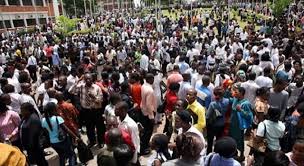Health
Sickle Cell Foundation Seeks Public Support
The Sickle Cell Foundation
Nigeria (SCFN), and Sickle Cell Club, Lagos, have called for public support to help improve the lives of people with Sickle Cell Disorders (SCD).
President, Sickle Cell Club, Mrs Ayo Otaigbe made this plea at the end of year celebration of the club held at the National Sickle Cell Centre, Lagos.
Otaigbe said that more research was also required to aid in the management of the disorder.
She stated that it is a documented fact that over 150,000 children are born every year in Nigeria with symptomatic sickle cell anemia with one in every four Nigerian as a carrier of the sickle cell gene.
“Many of these children die at infancy due to lack of information and appropriate care. Over the years, advances have been made to unravel the complex nature of SCD.
“However, the disorder is not well understood as expected and it is certainly not amenable to various drugs of unproven efficacy optimistically marketed in Nigeria.
“Therefore, more research is needed in various fronts, especially on the immediate cause of severe pain crises, so that rational therapy and not simply analgesics can be applied’’, she said.
According to her, the objective will be to effectively abort or prevent their occurrence.
Otaigbe said although SCD was not confined to Africa, over 80 per cent of affected children were born on the continent, yet Africa had shown apathy in addressing the major public health problem.
She enjoined Nigerians to make a difference and contribute to promote funding that will make meaningful research into SCD in Africa a reality.
The SCFN president said that the club had through its activities continued to increase public awareness and knowledge of the disorder especially through the establishment of sickle cell clubs, partnering with the SCFN and other stakeholders.
According to her, the focus for 2016 will be to consolidate on the successes recorded in 2015 and increase the level of awareness.
On his part, Prof. Olu Akinyaju, Chairman, SCFN, reiterated the need for Nigerians to support people with SCD as well as the establishment of at least one sickle cell centre in each state of the federation.
He said, “People should support persons with SCD; they should also support the centre and the clubs; there is a lot to be done in the area of SCD.
“We do not get enough donations, research has to be done, and workers need to be paid, people with SCD need tests, counselling and medication.
“We have a programme where we encourage everyone to give N5,000 monthly to the centre, it will mean a lot.
“In 2016, we will do more capacity building, it is very important and it will involve periodic counselling, training for personnel, doctors and nurses for emergency situations’’.
Akinyaju advised people with SCD to always keep warm, stay away from dust, sleep under mosquito nets, take medication and drink a lot of water during harmattan.
Mr Olasukanmi Rotimi, SCD person from the Apapa Sickle Cell Area Club, Lagos, said that people with SCD need a lot of care and attention.
He urged the public to always lend a comforting and helping hand to anyone who had the disorder.
Rotimi said that with adequate care, strict adherence to medication and appropriate lifestyle, people with SCD could also accomplish feats just like those who do not have the disorder.
Another SCD patient, Awaji Nsan Derick who described the attitude of most Nigerians towards SCD persons maintained that they are just like every other person and demand equal treatment.
Speaking to The Tide in Port Harcourt, she said “especially when you are a lady the guys act as if you are a less woman even to the extent of breaking our hearts emotionally and otherwise”, Derick further stressed the need for the establishment of the State centres to help later for their emergencies.
Health
‘How Micro RNA Research Won Nobel Prize’
Two United States scientists who unraveled the human micro RNA have won the Nobel Prize in Physiology or Medicine 2024.
Victor Ambros and Gary Ruvkun won the coveted prize for their work on microRNA as their discoveries help explain how complex life emerged on earth and how the human body is made up of a wide variety of different tissues.
MicroRNAs influence how genes – the instructions for life – are controlled inside organisms, including humans.
Every cell in the human body contains the same raw genetic information, locked in our DNA.
However, despite starting with the identical genetic information, the cells of the human body are wildly different in form and function.
The electrical impulses of nerve cells are distinct from the rhythmic beating of heart cells. The metabolic powerhouse that is a liver cell is distinct to a kidney cell, which filters urea out of the blood.
The light-sensing abilities of cells in the retina are different in skillset to white blood cells that produce antibodies to fight infection.
So much variety can arise from the same starting material because of gene expression.
The US scientists were the first to discover microRNAs and how they exerted control on how genes are expressed differently in different tissues.
The medicine and physiology prize winners are selected by the Nobel Assembly of Sweden’s Karolinska Institute.
They said: “Their groundbreaking discovery revealed a completely new principle of gene regulation that turned out to be essential for multicellular organisms, including humans.
“It is now known that the human genome codes for over 1,000 microRNAs.”
Health
WHO Begins Regulation On Antibiotic Waste
The World Health Organisation (WHO) has begun acting to curb effects of antibiotic pollution.
The new guidance on wastewater and solid waste management for antibiotic manufacturing sheds light on this important but neglected challenge ahead of the United Nations General Assembly (UNGA) High-Level Meeting on antimicrobial resistance (AMR) taking place on 26 September 2024.
The emergence and spread of AMR caused by antibiotic pollution could undermine the effectiveness of antibiotics globally, including the medicines produced at the manufacturing sites responsible for the pollution.
Despite high antibiotic pollution levels being widely documented, the issue is largely unregulated and quality assurance criteria typically do not address environmental emissions. In addition, once distributed, there is a lack of information provided to consumers on how to dispose of antibiotics when they are not used, for example, when they expire or when a course is finished but there is still antibiotic left over.
“Pharmaceutical waste from antibiotic manufacturing can facilitate the emergence of new drug-resistant bacteria, which can spread globally and threaten our health. Controlling pollution from antibiotic production contributes to keeping these life-saving medicines effective for everyone,” said Dr Yukiko Nakatani, WHO Assistant Director-General for AMR ad interim.
Globally, there is a lack of accessible information on the environmental damage caused by manufacturing of medicines.
“The guidance provides an independent and impartial scientific basis for regulators, procurers, inspectors, and industry themselves to include robust antibiotic pollution control in their standards,” said Dr Maria Neira, Director, Department of Environment, Climate Change and Health, WHO. “Critically, the strong focus on transparency will equip buyers, investors and the general public to make decisions that account for manufacturers’ efforts to control antibiotic pollution.”
Health
Kebbi Harmonises Doctors’ Salaries To Curb Brain Drain
In a concerted effort to curb brain drain, the Kebbi State Government has harmonised medical doctors’ salaries to be at par with their colleagues in the federal government’s tertiary health facilities.
Kebbi State Commissioner for Health, Musa Inusa-Isma’il, disclosed this at the handing over of ambulances to the state-owned health facilities at the Ministry of Health in Birnin Kebbi yesterday.
Inusa Isma’il, according to a statement by Ahmed Idris, the Chief Press Secretary to the governor, said the essence of the harmonisation was to retain the existing medical doctors and attract more to the services of the state.
According to him, the doctors across the state had already started enjoying the new salaries from August 2024.
He said the release of the vehicles was in fulfilment of Governor Nasir Idris’ promise to uplift health care services in the state.
“His Excellency said I should inform you, the beneficiaries of this gesture, that the vehicle should be strictly used for the intended purpose. It should not be used for anything else.
“If there is no referral case, each of the vehicles must be parked at the hospital by 6 pm. The governor said you should warn your drivers against reckless driving as well as violating the instructions.
“We should also do everything possible to reciprocate the gesture by working according to the terms and conditions attached,” he advised.
The benefiting health facilities included Sir Yahaya Memorial Hospital, Birnin Kebbi; State Teaching Hospital, Kalgo; General Hospital, Argungu; General Hospital, Yauri; General Hospital, Zuru; and General Hospital, Bunza.
In his speech, the permanent secretary of the ministry, Dr Shehu Koko, recalled that the ambulances were handed over to the ministry last Friday by the governor for the onward handover to the benefiting hospitals.
He observed that the ambulances would go a long way in improving the referral system in the state, adding that delays in reaching the secondary and tertiary facilities would be eliminated.
The permanent secretary attributed the high rate of maternal mortality in the country to delays in getting to the health facilities for proper medical care.
“We believe with the provision of these ambulances, part of the gaps we have in our referral system will be addressed, whereby patients who require secondary healthcare could be easily transported to secondary and tertiary health centres, where they can get such help,” he said.
In a goodwill message, Commissioner for Information and Culture Alhaji Yakubu Ahmed expressed gratitude to the governor for the support he has given to the ministry to excel.
While advising the beneficiaries to use the vehicles judiciously, the commissioner advised that services and maintenance of the vehicles must be prompt to derive the maximum benefits from the vehicles.
The commissioner also highlighted some achievements recorded by the government in the last year, including beautification of the state capital, completion of a multimillion-naira ultramodern state secretariat, road construction, construction and renovation of classrooms and upgrading of some health facilities, among others.
-

 News5 days ago
News5 days agoAny Threat To Nigeria’s Security‘ll Be Resisted – Ribadu
-
Rivers1 day ago
RSG Condemns Acts Of GBV … Calls For Collective Action
-
Opinion21 hours ago
Nigeria’s Electricity Sector: Need For Restructuring
-

 Opinion5 days ago
Opinion5 days agoGender Equity And Women Empowerment
-

 News5 days ago
News5 days agoHYPREP Distributes Starter Packs To Trainees
-

 News24 hours ago
News24 hours agoForge Unity For Progress, Fubara Urges Nigerian Youths …Accepts Beacon Of Hope Award
-
Politics20 hours ago
Inclusivity: Chief Whip Makes Case For Women
-

 Politics5 days ago
Politics5 days agoAlleged Ugochinyere’s Expulsion, Null, Void, No Effect – PDPNWC

